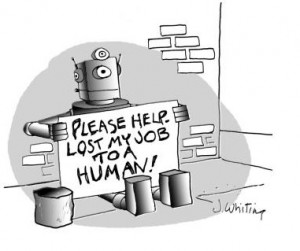The disappearing middle class has been a topic of much discussion in recent years. David A. Auter, Professor and Associate Department Head, Department of Economics, Massachusetts Institute of Technology is the author of “Polanyi’s Paradox and the Shape of Employment Growth.” While much has been made of the loss of jobs to automation and robots, Prof. Auter says that data indicates rather than a loss of jobs occurring, a rearrangement of jobs within the economy is taking place.
Auter finds that for Europe and the U.S., growth is occurring in low wage occupations and in high wage occupations while middle wage jobs have been declining over the past couple of decades. He relates this to the relationships between men and machines which he structures in the context of the 1966 proposition of physical scientist, social scientist and philosopher Michael Polanyi that intuitive knowledge is something that transcends learned theory. Following this reasoning he is not surprised to find that the onset of an age of automation and robots is not marked by the obsolescence of human “labor” but actually a redefinition of what that effort is, as reflected by the empirical data.
In 1966, the philosopher Michael Polanyi observed, “We can know more than we can tell… The skill of a driver cannot be replaced by a thorough schooling in the theory of the motorcar; the knowledge I have of my own body differs altogether from the knowledge of its physiology.”
Polanyi’s observation largely predates the computer era, but the paradox he identified-that our tacit knowledge of how the world works often exceeds our explicit understanding-foretells much of the history of computerization over the past five decades. This paper offers a conceptual and empirical overview of this evolution.
The challenges to substituting machines for workers in tasks requiring adaptability, common sense, and creativity remain immense. Contemporary computer science seeks to overcome Polanyi’s paradox by building machines that learn from human examples, thus inferring the rules that we tacitly apply but do not explicitly understand. David Auter Paper

